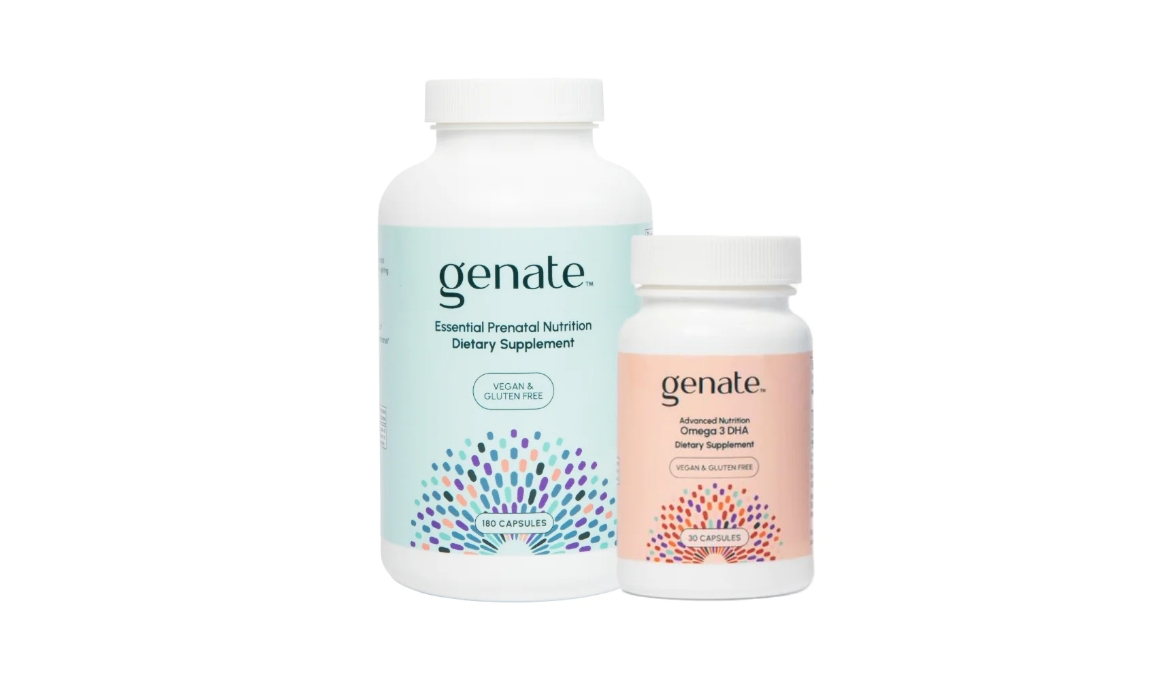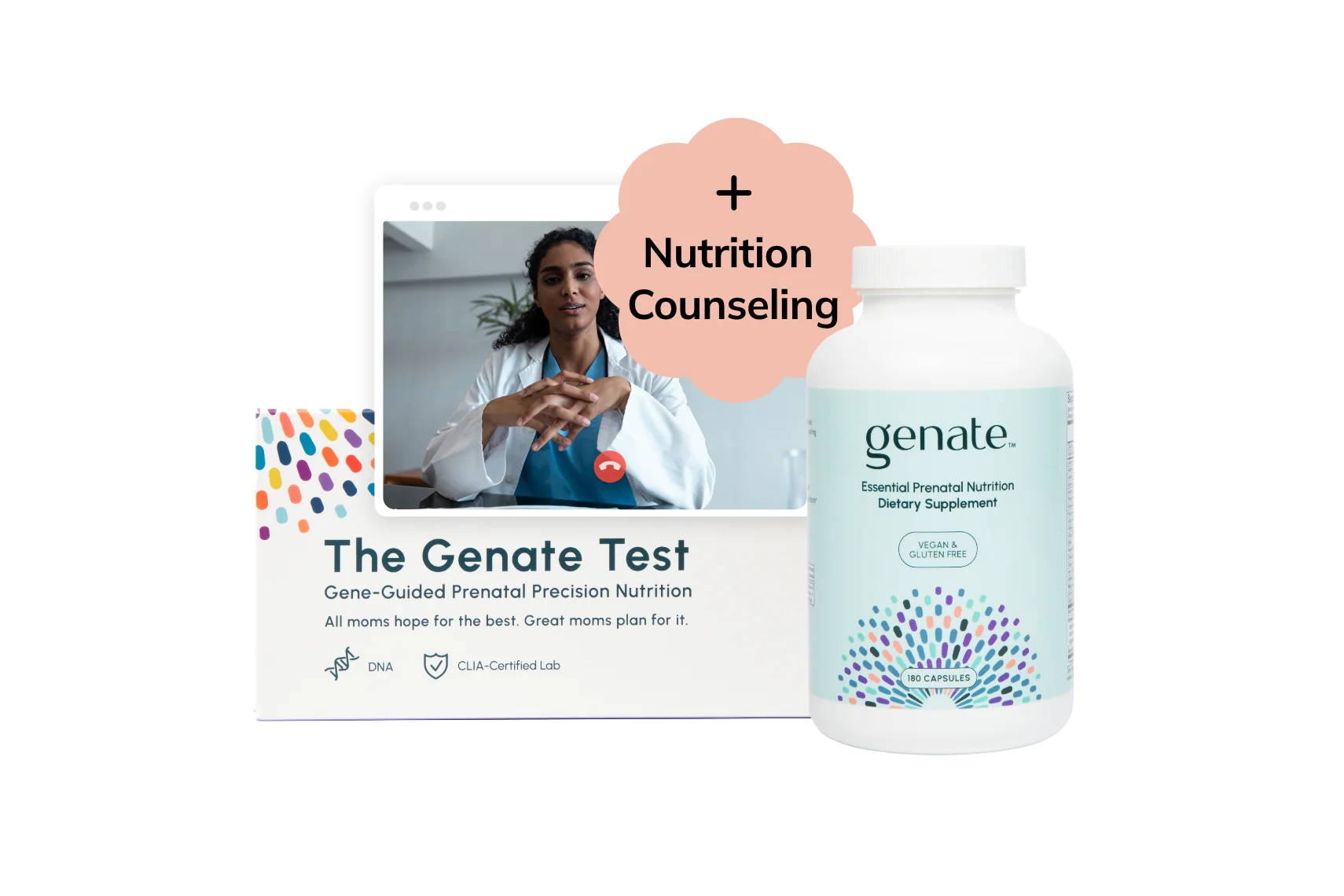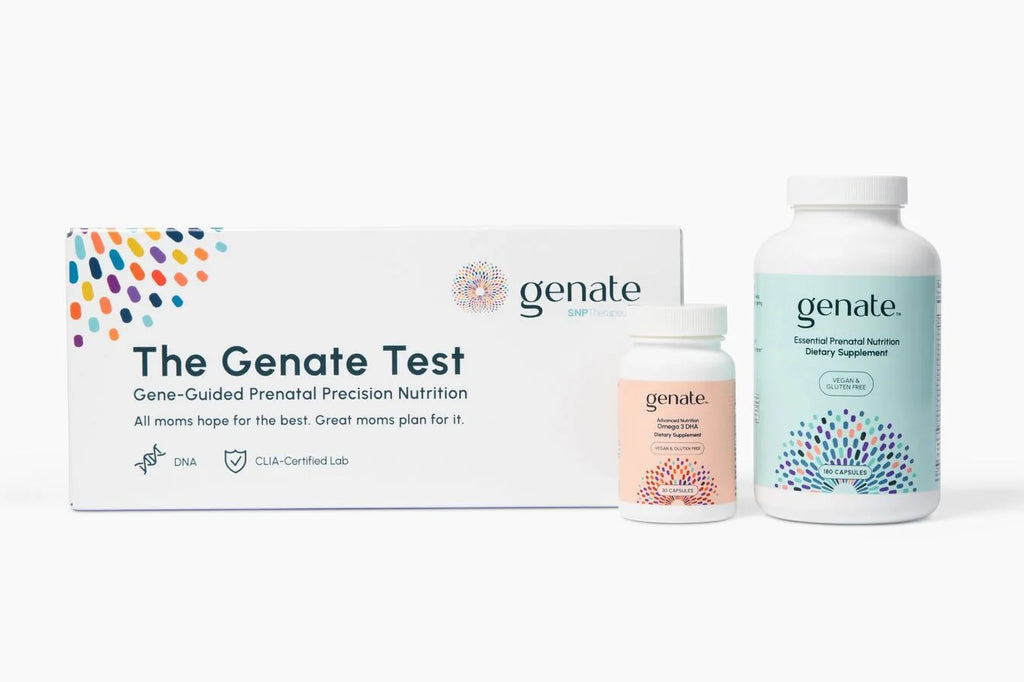You may experience constipation at any time during pregnancy, although it’s more common toward the end.

PREGNANCY SYMPTOMS
Treating Constipation While Pregnant
by Cara Everett, MS, RDN, LDN • October 23, 2023 • Updated August 23, 2024 •7-9 minute read
Constipation is a common occurrence during and after pregnancy, affecting up to 38% of women. It’s defined as fewer than three bowel movements per week with hard, dry stools. Low fiber and fluid intake, hormonal changes that prolong digestion time, and reduced physical activity can all contribute to constipation while you’re pregnant.
Let’s take a closer look at these causes, along with methods you can use to safely and effectively treat constipation when you’re expecting.
Causes of Constipation in Pregnancy
Although you may not notice discomfort from constipation during pregnancy until it’s interfering with your day-to-day activities or keeping you up at night, small changes could be working together to keep waste from passing out of your intestinal tract.
The most common causes of constipation during pregnancy include a lack of fiber in your diet, hormonal changes, gut bacteria, activity levels, and certain medications. We discuss each cause in-depth below:
Discover the genetics that affect your baby's cognitive development
Diet
The foods you eat during pregnancy play a key role in the composition of your stool. A diet low in fiber results in small, hard stools that can be difficult to eliminate. For example, meals made up of meat, dairy, and sugary foods will place you at higher risk of constipation.
Activity
Regular physical activity is one of the best ways to prevent constipation. But the discomfort and low energy levels that often accompany pregnancy can make exercise a challenge. And if your doctor has prescribed bedrest for preeclampsia, preterm labor, or another pregnancy complication, being physically active may seem impossible.
Medications and Supplements
Certain medications, such as anti-inflammatories and antidepressants, are known for causing constipation. Supplements can also be linked to this condition, one of which is iron. This mineral is an essential nutrient that’s needed in higher amounts in pregnancy, but it can affect how the bacteria in your gut break down food, leading to constipation in some cases.
Gut Microflora
One sign of a healthy gut is regular bowel movements. Conversely, constipation can be an indicator that your gut bacteria are out of balance. Treatment with probiotics and prebiotics is effective for some people.
- Probiotics: Microorganisms that promote the growth of good gut bacteria
- Prebiotics: Microorganisms that probiotics use for fuel
Hormonal Changes
When you become pregnant, progesterone levels in your body rise. This sets off a cascade of processes, one being that your intestines relax and become less active, prolonging digestion so your body can absorb more nutrients and fluid from the food you eat.
While this has a positive effect on your nutritional status and that of your baby, it can also lead to constipation during pregnancy by allowing your colon (large intestine) to absorb more water from your stool. This may result in smaller, drier stools that are hard to pass.
Symptoms of Constipation During Pregnancy
If you’re not sure what’s normal when it comes to bowel movements, take a look below for the most common signs of constipation:
- A bloated feeling
- Gas
- Fewer than three stools per week
- Stools that are hard, dry, and may be painful to pass
Top 4 Ways to Prevent Constipation While Pregnant
Constipation is one health issue that’s easier to prevent than it is to treat. The methods above can absolutely help if you’re currently dealing with a blockage, but using the preventative measures below will ward off constipation before things begin to back up. The result? You’ll stay much more comfortable and able to focus on the excitement of your little one’s arrival.
1. Drink Plenty of Fluids
Pregnancy raises your body’s fluid requirements significantly. Not only does your growing baby need fluids, but they’re also critical for a healthy placenta and adequate amniotic fluid volume. Your blood volume also increases dramatically in pregnancy, even doubling compared to pre-pregnancy levels. When your body is using fluid for these purposes, it needs more to aid the digestive process and provide enough fluid for soft stools.
To meet your fluid requirements during pregnancy, the American College of Obstetricians and Gynecologists recommends drinking 8-12 cups of fluid per day.
See the list below for smart ways to make sure you’re getting enough fluids:
- Decaf coffee
- Milk (dairy or plant-based)
- Water with a twist of lemon or lime juice
- Unsweet, decaf tea
It may be tempting to reach for juice or soda when you’re thirsty, but drinks containing caffeine or sugar can cause dehydration. These drinks—even those without sugar—can also lead to bloating and gas. If you’re dealing with abdominal discomfort, it’s a good idea to stick with flat beverages to reduce constipation during pregnancy.
2. Get Enough Fiber
Dietary fiber should be top of mind in pregnancy because it works in the intestinal tract to create stool bulk and maintain moisture. Adequate fiber intake can reduce constipation and excess weight gain during pregnancy, improve blood sugar control, and support the growth of healthy gut bacteria.
Fiber also offers other benefits for pregnant women: one 2019 study found that compared to women who ate 17 grams of fiber per day during and after pregnancy, those who consumed 27-32 grams of fiber per day gained less weight and body fat.
The 2020-2025 Dietary Guidelines for Americans advises pregnant women to aim for a daily fiber intake of 25-34 grams.
Soluble and insoluble fiber are both important for overall health, but insoluble fiber is more effective at moving digested food quickly through the intestines, preventing constipation. You can find insoluble fiber in foods like fruits, vegetables, and wheat bran.
Whole grains can also be a good source of fiber, but aim for most of your fiber intake from fruits and veggies because they provide more fluids than whole grains. It’s important to consume both fiber and fluids to prevent constipation during pregnancy.
Check this list for fiber-rich foods to add to your diet to help aid constipation during pregnancy.
- Artichoke hearts
- Avocado
- Beans, peas, and legumes
- Berries
- Brussels sprouts
- Chia seeds
- Dark chocolate
- Leafy greens
- Pears
Try to fill half of your plate with fruits and vegetables at every meal—including breakfast. If you get hungry between meals, try the high-fiber snack options below to help you stay full and prevent constipation.
Fiber supplements like metamucil and psyllium are also a convenient way to add fiber to your diet, and they can be incorporated into smoothies or other drinks. But before starting a fiber supplement, talk to your doctor first because they can affect the absorption of certain medications.

3. Eat the Right Foods
In addition to fiber, other food components can also promote bowel regularity and help prevent constipation during pregnancy.
Both probiotics and prebiotics support a healthy gut, which in turn helps increase stool bulk and ease its passage out of the intestines. Certain fruits contain sorbitol, a naturally occurring sugar alcohol, that can prevent and/or treat constipation.
See the table below for examples of each of these foods, and try to include them in your diet two to three times per day.
- Probiotic Food Sources
- Prebiotic Food Sources
- Foods with Laxative Properties
Yogurt
Kefir
Sauerkraut
Pickles
Miso
Tempeh
Onions
Garlic
Bananas
Leafy greens
Soybeans
Whole grains
Prunes
Prune juice
Apple juice
Pears
Pear juice
Figs
Ensure your baby is getting all the nutrients they need with Genate. Take our prenatal nutrition quiz to get started, or check out our Genate Test to learn about ways you can tailor your diet to your unique genetic needs. We can help you avoid genotype-based nutrient deficiencies and support your baby’s growth and development.
Learn more about prenatal nutrition with Genate’s Prenatal Nutrition Guide.
4. Get Moving
Low-impact exercise such as walking, swimming, and yoga can also promote healthy digestion and lower the risk of constipation during pregnancy. If you’re on bed rest or are otherwise unable to stay active, talk to your doctor about lower body exercises that can be done from your bed or a chair.
How to Treat Constipation While Pregnant
If you’re following the recommendations above and are still experiencing constipation while pregnant, try these safe remedies for treating constipation quickly.
- Enjoy a hot drink: Warm beverages such as tea or coffee can stimulate the bowels. While it’s not a good idea to get most of your fluids from caffeinated drinks, a little caffeine when you’re experiencing constipation can help produce a bowel movement.
- Walk and stretch: A brisk walk around the block or on a treadmill, combined with gentle stretches, can help get things moving. See this list of safe pregnancy stretches from the Mayo Clinic for ideas.
- Try a stool softener: If nothing seems to be helping, talk to your doctor about an over-the-counter product like Miralax or Colace to help ease your symptoms.
It can be tempting to reach for a laxative when you find yourself constipated during or after your pregnancy. Be sure to consult with your doctor before trying one, however.
Not much research has been done on the safety of laxatives during pregnancy. But we do know that their overuse can cause diarrhea, which may result in malabsorption of nutrients and fluid loss. If you’re having symptoms of constipation, talk to your doctor to explore safe options.
What Not to Do for Constipation While Pregnant
You should always avoid laxative pills while pregnant unless prescribed by your healthcare provider. Laxatives can be harmful during pregnancy for several reasons.
First, many laxatives work by irritating the intestines or increasing bowel contractions, which can potentially lead to uterine contractions and preterm labor. Second, some laxatives increase the risk of electrolyte imbalances and poor nutrient absorption by drawing water into the intestines and decreasing transit time. Finally, relying on laxatives to prevent constipation can lead to dependency, making it harder for the body to naturally regulate bowel movements.
It's crucial for expecting moms to consult their healthcare providers for safe and appropriate methods of managing constipation during pregnancy.
When to See Your Doctor About Constipation While Pregnant
You should see your doctor for constipation during pregnancy if it persists for more than a few days, causes severe discomfort, or is accompanied by bleeding during bowel movements. It's important to seek medical advice to ensure your well-being and address any potential underlying issues.
The Bottom Line on Constipation in Pregnancy
Pregnancy brings with it monumental changes to your body, and some of those changes can carry unwanted side effects. While constipation is a common occurrence during pregnancy, now you know the most effective ways to prevent it and how to treat it safely if it does happen.
Be sure to contact your healthcare provider if you haven’t had a bowel movement in more than a day or if you’re experiencing abdominal discomfort that’s interfering with your daily activities. It’s important to address constipation during pregnancy as soon as possible to avoid complications and get you back to feeling comfortable.
This article is not intended as medical advice to treat or diagnose any health condition but rather as educational health information for the general public. It should not be used as a substitute for individualized medical care from your healthcare provider.
Shop the Article
Save 23% today!
Genate Essential Prenatal Multivitamin + Advanced Omega-3 DHA Package
Bundle to increase savings and provide the foundational nutrients needed for optimal health and development.
From $72 per month
Save 23% today!
Comprehensive Prenatal Support Package
Genate Essential Prenatal Multivitamin + Advanced Omega-3 DHA + Phosphatidylcholine
Our most comprehensive bundle - you’ll receive our Essential Prenatal Multivitamin, Advanced Phosphatidylcholine, and Advanced Omega-3 DHA.
From $110 per month
Save 30% today!
Comprehensive Prenatal Nutrition Bundle
Buy the Genate Test and a nutrition counseling session with a Genate registered dietitian, and receive a 30-day supply of the Genate Essential Prenatal Multivitamin FREE. Purchase includes a 90-day prenatal multivitamin subscription at our best monthly price.
$309

About Cara Everett, MS, RDN, LDN
Cara is a registered dietitian nutritionist who specializes in prenatal, postpartum, and pediatric nutrition therapy as well as chronic inflammatory conditions. She has over twenty years of experience helping clients achieve their health goals by using food as medicine. In addition to working in clinical practice, Cara writes health articles that have been published on websites such as Verywell, Everyday Health, National Council on Aging, and MarketWatch.
Cara is passionate about translating medical research into information that everyone can use, and she loves showing her clients how to make diet changes that offer both quick and lasting results.
References
- Vasquez, Juan C. Constipation, Haemorrhoids, and Heartburn in Pregnancy. 2010;1411. British Medical Journal Clinical Evidence. https://pubmed.ncbi.nlm.nih.gov/21418682/
- Johns Hopkins Medicine. Foods for Constipation. https://www.hopkinsmedicine.org/health/wellness-and-prevention/foods-for-constipation
- Harvard Health. What to Do When Medication Makes You Constipated. (2019). https://www.health.harvard.edu/staying-healthy/what-to-do-when-medication-makes-you-constipated
- Ohkusa, Toshifumi, Koido, Shigeo, Nishikawa, Yuriko, and Sato, Nobuhiro. Gut Microbiota and Chronic Constipation: A Review and Update. Frontiers in Medicine. 2019;6(19). https://www.ncbi.nlm.nih.gov/pmc/articles/PMC6379309/
- Sanghavi, Monika and Rutherford, John D. Cardiovascular Physiology of Pregnancy. Circulation. 2014;130(12). 1003-1008. https://doi.org/10.1161/CIRCULATIONAHA.114.009029
- Barber, Thomas M, Kabisch, Stefan, Pfeiffer, Andreas F H, and Weickert, Martin O. The Health Benefits of Dietary Fibre. Nutrients. 2020; 12(10): 3209. https://doi.org/10.3390/nu12103209
- Hull H, Herman A, Gibbs H, et al. The effect of high dietary fiber intake on gestational weight gain, fat accrual, and postpartum weight retention: a randomized clinical trial. BMC Pregnancy and Childbirth. 2020; 20(319). https://doi.org/10.1186/s12884-020-03016-5
- U.S. Department of Agriculture and U.S. Department of Health and Human Services. Dietary Guidelines for Americans, 2020-2025. 9th Edition. (2020). https://www.dietaryguidelines.gov/sites/default/files/2020-12/Dietary_Guidelines_for_Americans_2020-2025.pdf
- Mayo Clinic. Pregnancy Stretches. (2023). https://www.mayoclinic.org/healthy-lifestyle/pregnancy-week-by-week/in-depth/pregnancy/art-20546838
- Trottier, Magan, Erebara, Aida, and Bozzo, Pida. Treating Constipation During Pregnancy. Canadian Family Physician. 2012;58(8). https://www.ncbi.nlm.nih.gov/pmc/articles/PMC3418980/
- Alookaran, Jeffrey and Tripp, Jayson. Castor Oil. StatPearls. Updated 2022. https://www.ncbi.nlm.nih.gov/books/NBK551626/#article-18998.s5
- NIH National Library of Medicine. Laxatives. (2022). https://www.ncbi.nlm.nih.gov/books/NBK582783/
Take the Genate Quiz
Take our Nutrition Quiz to learn more about your nutrition journey.
Read Our Latest Articles
Frequently Asked Questions
When does constipation during pregnancy start?
Is constipation during pregnancy common?
Yes, constipation is quite common among pregnant women. Close to 40% of women experience some degree of constipation when pregnant.
Does constipation during pregnancy have long-term effects?
Bowel movements usually return to normal frequency and consistency after pregnancy, as hormone levels return to pre-pregnancy levels.
Can constipation during pregnancy harm my baby?
If you’re experiencing constipation while pregnant, rest assured that it typically doesn’t cause negative effects for your baby.








